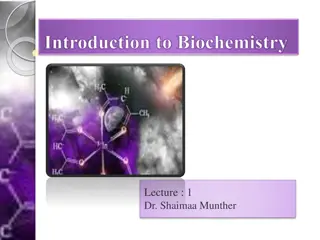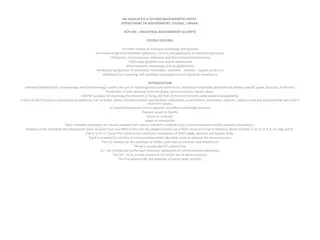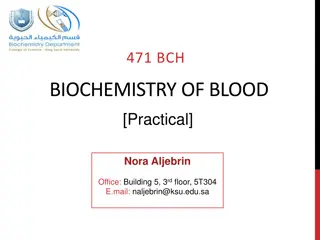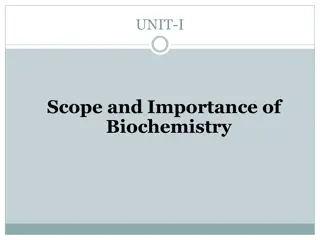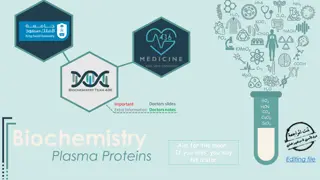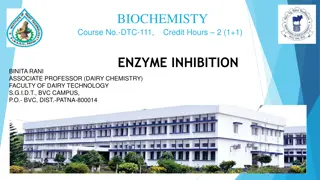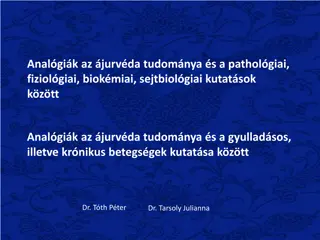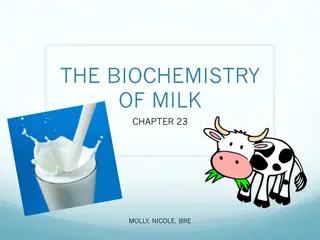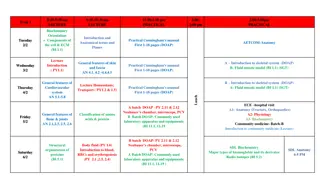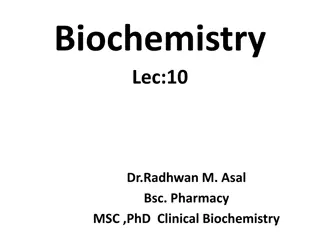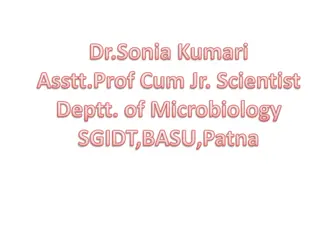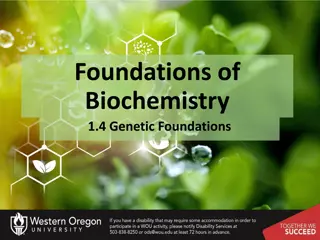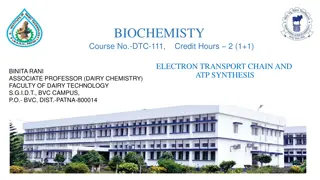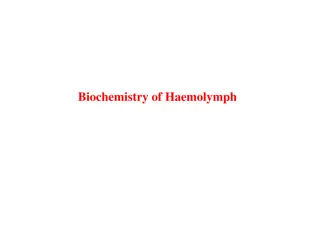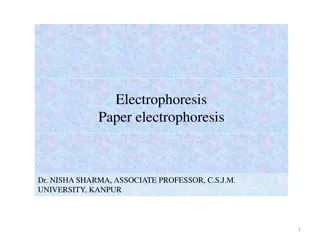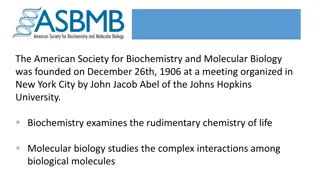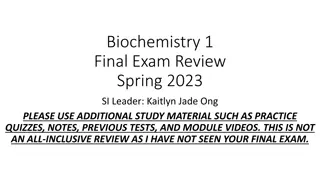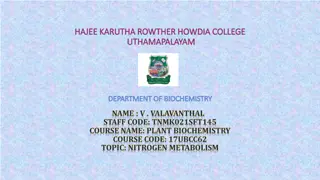Exploring the World of Biochemistry
Biochemistry is a branch of science that focuses on the study of the chemical processes and substances that occur within living organisms. It delves into the structure, composition, and function of biological molecules such as proteins, nucleic acids, carbohydrates, and lipids. Biochemists utilize a combination of biology and chemistry to investigate the intricate mechanisms that drive cellular processes, metabolism, and genetic expression. This field plays a crucial role in advancing our understanding of diseases, developing new medicines, and creating innovative biotechnologies.
Download Presentation

Please find below an Image/Link to download the presentation.
The content on the website is provided AS IS for your information and personal use only. It may not be sold, licensed, or shared on other websites without obtaining consent from the author.If you encounter any issues during the download, it is possible that the publisher has removed the file from their server.
You are allowed to download the files provided on this website for personal or commercial use, subject to the condition that they are used lawfully. All files are the property of their respective owners.
The content on the website is provided AS IS for your information and personal use only. It may not be sold, licensed, or shared on other websites without obtaining consent from the author.
E N D
Presentation Transcript
The word BIOCHEMISTRY- means -Chemistry of Living beings or Chemical Basis of Life.
Life in Biochemistry point of view is: Hundreds of Biochemical reactions and Biochemical processes Occurring in sub cellular organelles of a cell in an organized manner.
Biochemistry is a branch of life science: Which deals with the Study of Biochemical Reactions and Processes Occurring in living cells of organisms.
Medical Biochemistry-Deals with chemical basis of human body. Clinical Biochemistry-Deals with clinical diseases/pathological conditions of human body.
Clinical Biochemistry supports: Diagnosis, Therapy and Research of Medical field.
Bacterial Biochemistry-Deals with Microbes. Plant Biochemistry- Deals with Plants. Animal Biochemistry-Deals with animals. Industrial Biochemistry-Deals with industrial products involved with microorganisms.
Historical Developments of Biochemistry
Biochemistry emerged in the late 18th and early 19th century. The term Biochemistry was first introduced by the German Chemist Carl Neuberg in 1903. In the 1940s Clinical Biochemistry evolved, as an autonomous field.
S.No Pioneer Workers Discovery/Work 1 Berzilus Enzymes Catalysis 2 Edward Buchner Enzyme Extraction 3 Louis Pasteur Fermentation Process 4 Lohmann Role of Creatine PO4 in muscles TCA Cycle 5 Hans Kreb 6 Banting and Macleod Insulin 7 Fiske and Subbarow Role of ATPs
S.No Pioneer Worker Discovery/Work 8 Watson and Crick Double Stranded DNA Protein Structure 9 Landsteiner 10 Peter Mitchell Oxidative Phosphorylation Genetic Code on mRNA Recombinant DNA Technology Polymerase Chain Reaction Synthesized Gene 11 Nirenberg 12 Paul Berg 13 Karry Mullis 14 Khorana
Aim And Objectives To Study Biochemistry
To know the various Biomolecules composed in Human body: Chemistry/Structure Occurrence/Location Functions/Role
Determination of mode of action of Biomolecules is by: Isolation and Structural elucidation of Biomolecules.
Understand completely all the organized Biochemical processes Occurring in living cells at the molecular/sub cellular level .
Identification of disease mechanisms: Study of Inborn Errors of metabolism. Study of Oncogenes in cancer cells.
Medical Biochemistry Medical or Human Biochemistry is a branch of Biochemistry which deals with: Biochemical constituents of human body Their interactions in body cells To maintain normal health, growth and reproduction and related diseases.
Study of Biochemical aspects of Cell and its sub cellular organelles.
Study of various Biochemical constituents of cell: (Chemistry, properties , functions, metabolism and related disorders). Carbohydrates Lipids Proteins Vitamins Minerals Water
Nutrition and Metabolism of Biomolecules
Study of Food and its constituents Dietary Nutrients builds human body and maintain health
Major prerequisite for the maintenance of health is that There should be optimal dietary intake of constituents with good quality and appropriate quantity.
Biochemical research has impact on Nutrition & Preventive Medicine.
Metabolism of Biomolecules Ingestion Digestion Absorption Transport Uptake and Assimilation of food constituents in human body.
Catabolic and Anabolic pathways related to Biomolecules for Human vitality:
Energy rich biomolecules get catabolized in body cells to liberate chemical form of energy ATP used for various body activities. Various biomolecules are biosynthesized to perform vital functions of human body.
To maintain normal health of a human body: Biomolecules in human body work Cooperatively with good coordination ,Regulation and Interrelationship.
Carbohydrates serves as primary source of energy. Lipids serves as secondary source of energy. Proteins are structural and functional units of human body which are of prime importance and survival of human beings.
Vitamins: Fat soluble and Water soluble vitamins have specific functions which serve as accessory growth factors. Minerals: Inorganic elements major and minor type has important role in building and functioning of human bodies.
Enzymes are biomolecules which are Biocatalysts catalyzes specific biochemical reactions of metabolic pathways and considered as functional units of metabolism. Hormones the Endocrine substances, chemical messengers of human body. They bring good coordination and regulate enzyme activities of metabolism.
Elements of Molecular Biology Nucleic acids and Molecular Genetics DNA, RNA and Protein synthesis Regulation of gene expression Recombinant DNA technology
Biochemical Processes of Human Body
Membrane transport mechanisms and signal transduction Biochemical mechanisms of hormone action-Cellular Homoeostasis Functions of Neurotransmitters Oxygen transport, Bioenergetics, Mitochondrial Respiratory chain The Immune response
Biochemistry Is A Fundamental Subject Of Medicine/MBBS
Biochemistry is related to almost every Subject of Medicine.
There is relationship of Biochemistry with Many subjects of MBBS Course. Physiology Pathology Pharmacology Immunology - Microbiology Toxicology Medicine and Allied Subjects Community Medicine-Nutrition Genetics
Importance Of Biochemistry Knowledge To A Doctor
Clear understanding concepts of Biochemistry Is a prerequisite to become A Good Doctor
A thorough understanding knowledge, of Biochemistry by a Doctor helps in: Right Diagnosing and treating a patient .
The Scope for Study and Research in Biochemistry is Endless
Principal driving force in Clinical Biochemistry. New emerging techniques and methodologies to study new Biomarkers
The scope of Biochemistry is to understand The functionality of the living cells, tissues and the entire living system.
Biochemistry Teaching Schedule


